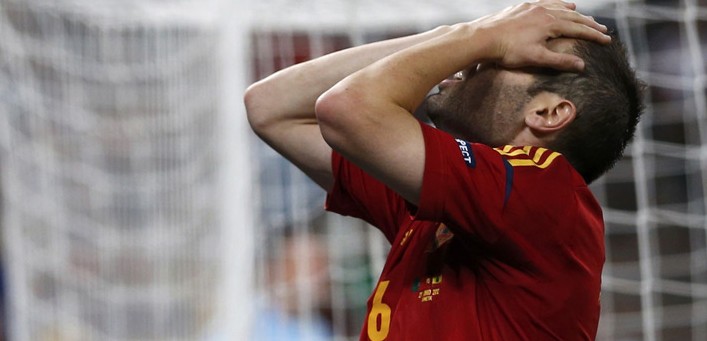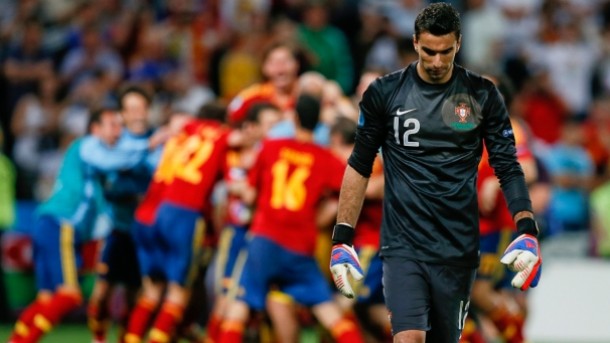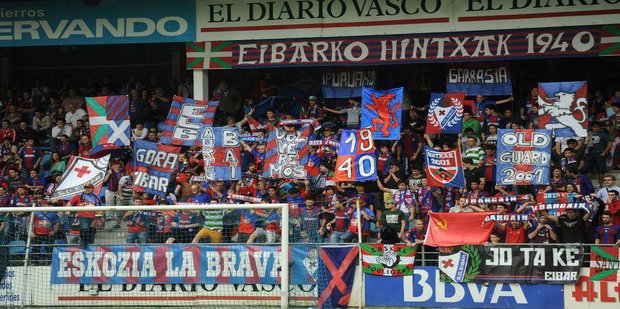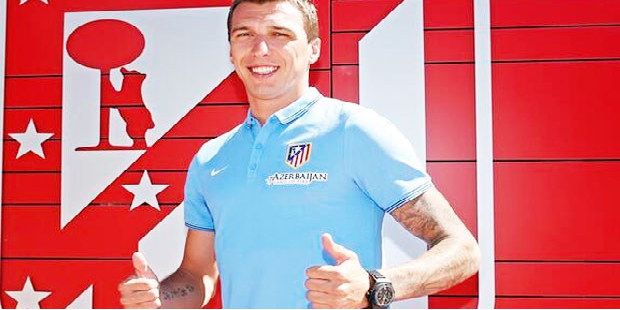- S.D. Eibar ready for maiden La Liga outing
- SD Eibar stengthen ahead of debut La Liga season
- Can ‘Super Mario’ live up to expectations in Madrid?
- MAN IN THE GROUND – Brentford 0 – 4 Osasuna
- Historic Basque derby welcomes S.D. Eibar to La Liga
- Munich to Madrid, via Brazil – Tony Kroos
- Rakitic in Spanish Switch
- Can Spain find redemption in Rio?
- Viva Espana! A season of redemption for Spanish football
- From the old to the new: who can fill the void in years to come for La Roja?
The death of Tiki-Taka or the next evolution in Spanish football?
- Updated: 4 July, 2012


Not only did Spain win Euro 2012 conceding just once, they scored more goals, took more shots on target and enjoyed the most possession of any other team at the tournament.
Nonetheless, and their 4-0 wins over Ireland and Italy aside, Vicente Del Bosque’s team have drawn increasing criticism from a number of onlookers who have drawn parallels with an FC Barcelona side that saw their Champions League and La Liga campaigns end in something of a whimper.
The Spanish side that won their first trophies in 44 years was heavily influenced by Barcelona’s players and their style of play, however that structure has now been diminished due in part to the injuries suffered by David Villa and Carles Puyol plus the hefty loss in form from Pedro Rodriquez.
In stepped the Madridistas; Sergio Ramos impressive form at centre half has allowed him to become a more than adequate replacement for Puyol alongside Gerard Pique, with club mate Alvaro Arbeloa filling in his vacated spot at right back. Iker Casillas remains the teams undisputed number one and Xabi Alonso’s impact continues to be as big as any player in the match day squad.
Madrid players were outnumbered by six (and often seven when Pedro was included) to three at the 2010 World Cup, but the current starting eleven, if Fernando Torres plays up front, contains four players from each of La Liga’s big two, and five from Barcelona when Fabregas comes in.
There was a clear and re-occurring sight in Real Madrid games this season when Real needed a tie breaking goal; they would soak up pressure before Xabi Alonso would pick up the ball, feed it quickly to Mesut Ozil, Angel Di Maria or Cristiano Ronaldo who would then lap up each yard of the pitch before calmly putting the ball on a plate for Gonzalo Higuain or Karim Benzema to pick a side past the opposition goal keeper.
The speed and precision with which Real Madrid broke was breath taking. It was quick, brilliantly executed and most importantly, efficient.
Efficiency hasn’t been a strong point as of late for Barcelona or indeed Spain. Chance after chance was created, but unlike Barca’s treble winning campaign or La Seleccion’s cup winning runs, the ball stopped going in the net, and the inevitable feeling that it soon would began to wear off, being replaced with panic.
Barcelona and Spain are now having to deal with their lack of impactful options to combat that panic. Despite Lionel Messi’s record breaking campaign his early season form away from the Camp Nou meant Barcelona had to count on other options who were also unable to get the crucial goals their team needed, and the pressure increased as Real Madrid were winning on almost every occasion, the recently crowned champions began to disappear into the distance.
Now those champions are impacting on the national side, along with their trio of counterparts for Portugal. Had the highest profile of the three, Cristiano Ronaldo, taken his chances, it could have been Portugal in the final instead.
The obvious parallel between Spain and Barca is the monumental loss of David Villa for both sides. It would be very easy to put forward a case insisting Spain may well not have won either of their first two trophies without Villa, their all-time record scorer, and with Fernando Torres’ huge loss of form Spain have had to adapt.
So have Barcelona, no longer a team blessed with natural goal scorers the like Thierry Henry or Samuel Eto’o, Messi’s early season form away from home cost his team dearly in the race for the title, as did Alexis Sanchez’ bedding-in time.
Now you see in Spain and Barcelona, two teams where the centre-halves spend nearly as much time with the ball as any other. The team takes fewer risks, long shot and crosses. They wait for the right opportunity, in the right area of the pitch with the right player, if it fails to materialise on a particular occasion, that’s fine, “get the ball, pass the ball, get the ball, pass the ball” as Guardiola famously said; let the other team do the running and look for another opportunity.
Barcelona struggled to find the net in the league and also in the Champions League, but a fit David Villa would no doubt aid that, as would the more than likely future signing of Neymar; someone set to appear on Ballon d’Or shortlists on a regular basis.
Spain also need David Villa back as soon as possible, if an out of form Torres managed to win the tournaments golden boot they will hope Villa can have an even bigger impact on his return. Spain, like Barcelona will encounter the same problems with age as Villa turns 31 at the end of the year, but with Adrian Lopez’s rapid improvement they have a ready set replacement for the number seven shirt.
‘Tiki-Taka’ isn’t dying, it’s changing. It’s becoming more resourceful when key players aren’t available, and as next season could well prove with the return of David Villa, it could become even more successful when they are. Their fiercest rivals, Real Madrid and Portugal, have caught right up. Spain have evolved, now its Barcelona’s turn.
Follow @icentrocampista
Related Posts
3 Comments
You must be logged in to post a comment Login






Pingback: The death of Tiki-Taka or the next evolution in Spanish football? – El Centrocampista
Pingback: Del Bosque adds European title to World – FOXSports.com